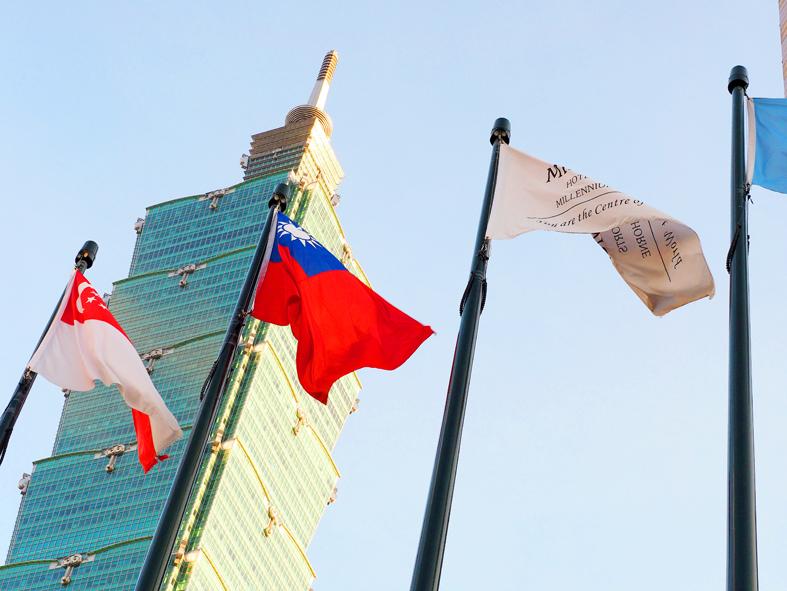Taipei 101 remains the commercial property with the highest land value in Taipei for the eighth consecutive year, the Taipei Department of Land Administration said yesterday.
The land value of Taipei 101, the tallest building in the nation, rose to NT$1.83 million (US$64,253) per square meter, or NT$6.07 million per ping (3.3m2), up 2.11 percent from a year earlier, the department’s land valuation assessment report showed.
Over the past eight years, the land value of the building has risen 20.86 percent, Pan Yi-ju (潘依如), head of the department’s land value division, told reporters.

Photo: David Chang, EPA-EFE
Shin Kong Life Tower (新光摩天大樓), across from Taipei Railway Station, followed with a land value of NT$1.78 million per square meter, or NT$5.88 million per ping, the report showed.
The building had the highest land value in Taipei from 2000 to 2013 before Taipei 101 took the top spot, the department said.
As for residential properties, the Palace Mansion (宏勝帝寶) on Renai Road had the highest land value of NT$1.33 million per square meter, or NT$4.39 million per ping, for the 10th consecutive year, the report showed.
Land values in Taipei this year rose an average of 2.17 percent from a year earlier, the third straight year in which values have risen, Pan said, adding that property and home values in the city have grown “gradually and steadily” over the past few years.
Among the 4,668 sections in Taipei, the value of 4,312, or 92.37 percent, rose this year, while the value of 209 sections remained flat, and the value of the remaining 147 sections fell, she said.
Among the 12 administrative districts in Taipei, Nangang District (南港) reported the highest increase in land value, with an increase of 3.38 percent, due to new city planning projects, the report showed.
Wenshan District (文山) reported the lowest hike of 1.01 percent, owing to its relatively remote location, less convenient transport links, and as large areas of land are designated as protected and cannot be developed.
The COVID-19 pandemic has adversely affected some commercial property in Taipei, with the land value of Shilin Night Market (士林夜市), which used to be a popular tourist destination, declining 1.93 percent amid enhanced border controls and a significant drop in international travel, Pan said.
In addition, the land value in the Ximen (西門) and Eastern business circles, both of which previously relied on tourism, fell 0.43 percent and 0.30 percent respectively, she said.
Department of Land Administration Commissioner Chang Chih-hsiang (張治祥) said some international hotels in Taipei were also affected by the pandemic, with the Mandarin Oriental Hotel’s (文華東方酒店) land value falling 2.01 percent, the steepest drop among luxury hotels.
The report on real-estate values is submitted annually to the central government’s Land Evaluation Committee, which uses the data to determine compensation in cases where private property in the city is expropriated by the government for public use under the Equalization of Land Rights Act (平均地權條例).

CAUTIOUS RECOVERY: While the manufacturing sector returned to growth amid the US-China trade truce, firms remain wary as uncertainty clouds the outlook, the CIER said The local manufacturing sector returned to expansion last month, as the official purchasing managers’ index (PMI) rose 2.1 points to 51.0, driven by a temporary easing in US-China trade tensions, the Chung-Hua Institution for Economic Research (CIER, 中華經濟研究院) said yesterday. The PMI gauges the health of the manufacturing industry, with readings above 50 indicating expansion and those below 50 signaling contraction. “Firms are not as pessimistic as they were in April, but they remain far from optimistic,” CIER president Lien Hsien-ming (連賢明) said at a news conference. The full impact of US tariff decisions is unlikely to become clear until later this month

Popular vape brands such as Geek Bar might get more expensive in the US — if you can find them at all. Shipments of vapes from China to the US ground to a near halt last month from a year ago, official data showed, hit by US President Donald Trump’s tariffs and a crackdown on unauthorized e-cigarettes in the world’s biggest market for smoking alternatives. That includes Geek Bar, a brand of flavored vapes that is not authorized to sell in the US, but which had been widely available due to porous import controls. One retailer, who asked not to be named, because

CHIP DUTIES: TSMC said it voiced its concerns to Washington about tariffs, telling the US commerce department that it wants ‘fair treatment’ to protect its competitiveness Taiwan Semiconductor Manufacturing Co (TSMC, 台積電) yesterday reiterated robust business prospects for this year as strong artificial intelligence (AI) chip demand from Nvidia Corp and other customers would absorb the impacts of US tariffs. “The impact of tariffs would be indirect, as the custom tax is the importers’ responsibility, not the exporters,” TSMC chairman and chief executive officer C.C. Wei (魏哲家) said at the chipmaker’s annual shareholders’ meeting in Hsinchu City. TSMC’s business could be affected if people become reluctant to buy electronics due to inflated prices, Wei said. In addition, the chipmaker has voiced its concern to the US Department of Commerce

STILL LOADED: Last year’s richest person, Quanta Computer Inc chairman Barry Lam, dropped to second place despite an 8 percent increase in his wealth to US$12.6 billion Staff writer, with CNA Daniel Tsai (蔡明忠) and Richard Tsai (蔡明興), the brothers who run Fubon Group (富邦集團), topped the Forbes list of Taiwan’s 50 richest people this year, released on Wednesday in New York. The magazine said that a stronger New Taiwan dollar pushed the combined wealth of Taiwan’s 50 richest people up 13 percent, from US$174 billion to US$197 billion, with 36 of the people on the list seeing their wealth increase. That came as Taiwan’s economy grew 4.6 percent last year, its fastest pace in three years, driven by the strong performance of the semiconductor industry, the magazine said. The Tsai